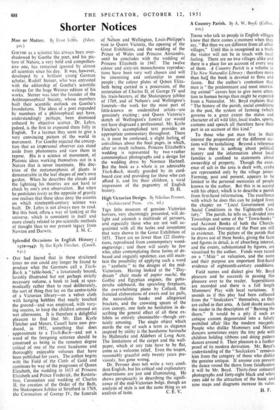Shorter Notices
Man or Matter. By Ernst Leli, (Faber.
3os.)
GOETHE as a scientist has always been over- shadowed by Goethe the poet, and his pic- ture of Nature, a very bold and comprehen- sive one, has remained ignored by almost all scientists since his day. It was, however, developed by a brilliant young- German scholar, Rudolf Steiner, who-'was entrusted with the editorship of Goethe's scientific writings for the huge Weimar edition of his works. Steiner was later the founder of the Anthroposophical Society, whose members built their scientific outlook on Goethe's foundations. The ideas of a poet expanded by members of a philosophical sect have, understandingly perhaps, been dismissed unheard by objective science. Dr. Lehrs, indeed, is the first to expound them fully in English. To a layman they seem to give a very convincing picture of. the world in Movement. For Goethe rejected the concep- tion that an impersonal observer can stand aside from phenomena and view them in repose. His is a science of movement, of Platonic ideas working themselves out in a Nature that is never inanimate. His doc- trine of the metamorphosis of plants is demonstrable in the leaf shapes of one's own garden. When he describes the clouds and the lightning his theories are not hard to check by one's own observation. , But when he postulates levity as the opposite of gravity one realises that these ideas deny the axioms on which nineteenth-century science was built. Dr. Lehrs is not always easy to read. But this book offers a way of looking at the universe, which is consistent in itself and more closely related to pre-scientific methods of thought than to our present legacy from


































 Previous page
Previous page